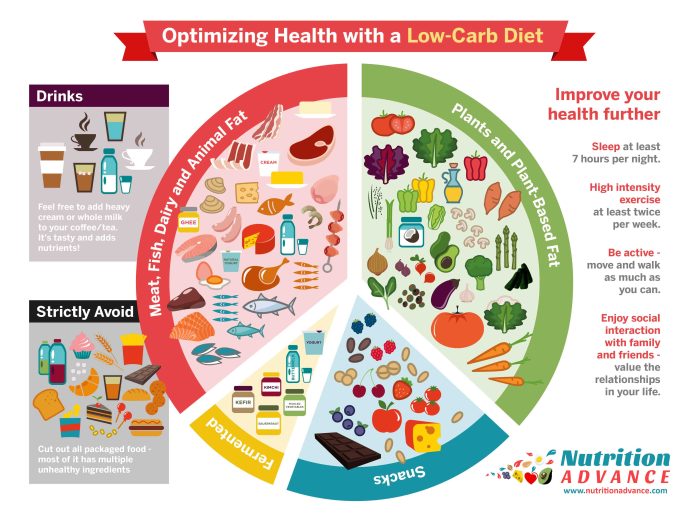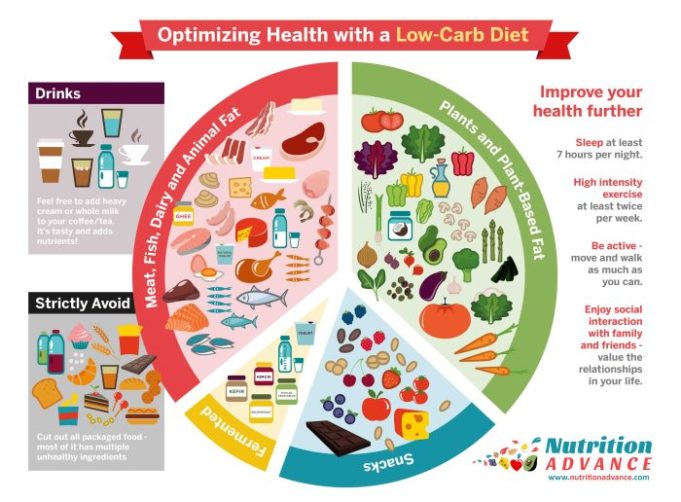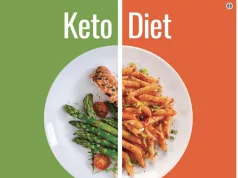What does low carb diet do – What does a low-carb diet do? This question has become increasingly popular as people seek ways to improve their health and well-being. Low-carb diets have gained significant attention for their potential benefits in weight loss, metabolic health, and blood sugar control. However, it’s essential to understand the nuances of different low-carb approaches, their potential risks, and the importance of long-term sustainability.
Low-carb diets involve reducing carbohydrate intake while increasing the consumption of protein and healthy fats. This shift in macronutrient ratios can lead to various physiological changes, impacting energy production, hormone levels, and overall metabolic function. While the concept of restricting carbs may seem straightforward, the complexities of different low-carb diets and their individual effects warrant further exploration.
What is a Low-Carb Diet?: What Does Low Carb Diet Do
A low-carb diet, as the name suggests, is an eating plan that restricts carbohydrate intake, focusing on consuming more protein and fat. The fundamental principle behind low-carb diets is to reduce the body’s reliance on carbohydrates as its primary energy source, prompting it to burn stored fat instead. This shift in energy metabolism can lead to weight loss and potential health benefits.
Types of Low-Carb Diets
There are several variations of low-carb diets, each with its unique approach and emphasis on specific food groups. Some popular examples include:
- Ketogenic Diet: This diet is extremely low in carbohydrates (typically 5-10% of daily calories), moderate in protein (15-20%), and high in fat (70-80%). The goal is to induce a metabolic state called ketosis, where the body starts burning fat for energy instead of glucose.
- Atkins Diet: The Atkins diet is a four-phase plan that gradually reduces carbohydrate intake. It begins with a very low-carb induction phase, followed by a gradual increase in carbohydrates as weight loss progresses.
- South Beach Diet: The South Beach diet focuses on limiting refined carbohydrates, sugary drinks, and unhealthy fats. It emphasizes whole grains, lean protein, and healthy fats, promoting a balanced and sustainable approach to weight management.
Macronutrient Breakdown
The macronutrient breakdown of a low-carb diet typically varies depending on the specific type of diet followed. However, in general, low-carb diets emphasize a higher intake of protein and fat compared to carbohydrates.
A typical low-carb diet may have a macronutrient breakdown of approximately 20-30% carbohydrates, 30-40% protein, and 40-50% fat.
Benefits of a Low-Carb Diet
A low-carb diet can offer numerous benefits, particularly in terms of weight loss and metabolic health. This approach focuses on reducing carbohydrate intake, which can lead to various positive outcomes.
Weight Loss
Low-carb diets are often effective for weight loss. By limiting carbohydrates, the body is forced to utilize stored fat for energy, leading to fat burning and weight reduction.
“A low-carb diet can help people lose weight by reducing their overall calorie intake and increasing their metabolism.”
Several studies have demonstrated the effectiveness of low-carb diets for weight loss. For example, a study published in the Journal of the American Medical Association found that participants following a low-carb diet lost more weight than those on a low-fat diet.
Improved Blood Sugar Control
Low-carb diets can be beneficial for individuals with diabetes or those at risk of developing the condition. By reducing carbohydrate intake, blood sugar levels can be better controlled, reducing the need for medication or insulin injections.
“Low-carb diets can help regulate blood sugar levels by reducing the amount of glucose entering the bloodstream after meals.”
A study published in the journal Diabetes Care found that a low-carb diet was more effective than a low-fat diet at improving blood sugar control in individuals with type 2 diabetes.
Potential Risks and Side Effects
While low-carb diets can offer various health benefits, it’s crucial to understand potential risks and side effects associated with long-term adherence. These diets, if not carefully planned and monitored, may lead to certain health concerns.
Potential Nutrient Deficiencies
Low-carb diets often restrict fruits, vegetables, and whole grains, which are rich sources of essential nutrients. This can lead to deficiencies in crucial vitamins and minerals, impacting overall health.
- Vitamin B1 (Thiamin): Found in whole grains, legumes, and nuts, thiamin plays a vital role in energy production and nerve function. Deficiency can lead to fatigue, muscle weakness, and neurological problems.
- Vitamin B9 (Folate): Crucial for cell growth and development, folate is abundant in leafy greens, beans, and fortified cereals. Deficiency can lead to anemia and birth defects during pregnancy.
- Vitamin C (Ascorbic Acid): A powerful antioxidant found in citrus fruits, berries, and leafy greens, vitamin C is essential for immune function and collagen production. Deficiency can lead to fatigue, gum disease, and slow wound healing.
- Potassium: An electrolyte crucial for maintaining fluid balance and muscle function, potassium is found in bananas, potatoes, and leafy greens. Deficiency can lead to muscle weakness, fatigue, and irregular heartbeat.
- Magnesium: Essential for energy production, muscle function, and nerve function, magnesium is found in leafy greens, almonds, and avocado. Deficiency can lead to fatigue, muscle cramps, and headaches.
To address potential nutrient deficiencies, it’s essential to focus on consuming a variety of nutrient-rich foods within the low-carb framework. This includes:
- Non-starchy vegetables: Broccoli, cauliflower, spinach, and kale are low in carbohydrates and rich in vitamins, minerals, and fiber.
- Nuts and seeds: Almonds, walnuts, chia seeds, and flaxseeds are good sources of healthy fats, fiber, and essential nutrients.
- Low-carb fruits: Berries, avocados, and tomatoes can provide essential vitamins and antioxidants while remaining within a low-carb framework.
- Supplementation: In some cases, a multivitamin and mineral supplement may be beneficial to ensure adequate intake of essential nutrients.
Common Side Effects
While not experienced by everyone, some common side effects can occur during the initial phase of a low-carb diet, as the body adjusts to the reduced carbohydrate intake.
- Fatigue: This is often caused by the body’s reliance on fat for energy instead of carbohydrates. It typically subsides as the body adapts.
- Headaches: These can occur due to changes in blood sugar levels and dehydration. Staying hydrated and consuming electrolytes can help alleviate headaches.
- Constipation: Low-carb diets often reduce fiber intake, which can lead to constipation. Increasing fiber intake through non-starchy vegetables and psyllium husk can help.
- Bad Breath: This can occur due to the breakdown of fat for energy, producing ketones that can cause a fruity odor on the breath. It usually subsides as the body adapts.
Foods to Eat and Avoid
Following a low-carb diet involves making conscious choices about the foods you consume. You’ll need to limit high-carb foods and focus on incorporating plenty of low-carb options into your meals.
High-Carb Foods to Avoid
It is crucial to limit or avoid high-carb foods on a low-carb diet. These foods are often high in refined carbohydrates, which can spike blood sugar levels and hinder weight loss.
- Sugary drinks: Soft drinks, fruit juices, energy drinks, sweetened teas, and sports drinks are loaded with sugar.
- Processed foods: Many processed foods, such as cookies, cakes, pastries, crackers, and white bread, are high in refined carbohydrates and added sugars.
- Starchy vegetables: While vegetables are generally healthy, starchy vegetables like potatoes, corn, peas, and parsnips are relatively high in carbs.
- Grains: Refined grains like white rice, white bread, pasta, and cereal are high in carbs and low in fiber.
- Fruit: While fruits are nutritious, they contain natural sugars. It’s important to consume fruits in moderation on a low-carb diet.
Low-Carb Foods to Include
A low-carb diet emphasizes foods that are naturally low in carbohydrates and rich in nutrients. These foods can help you feel full and satisfied while keeping your carb intake low.
- Non-starchy vegetables: Leafy greens, broccoli, cauliflower, Brussels sprouts, asparagus, and spinach are excellent sources of vitamins, minerals, and fiber.
- Meat and poultry: Lean sources of protein like chicken, turkey, fish, beef, and pork can be incorporated into a low-carb diet.
- Eggs: Eggs are a versatile and nutrient-dense food that’s low in carbs.
- Dairy: Full-fat dairy products like cheese, yogurt, and cream can be included in moderation on a low-carb diet.
- Nuts and seeds: Almonds, walnuts, chia seeds, and flaxseeds are good sources of healthy fats, fiber, and protein.
- Berries: Berries like strawberries, blueberries, and raspberries are relatively low in carbs compared to other fruits.
Sample Meal Plan
Here’s a sample meal plan for a low-carb diet:
Breakfast
- Scrambled eggs with spinach and cheese
- Greek yogurt with berries and nuts
- Avocado toast with smoked salmon
Lunch
- Tuna salad with lettuce wraps
- Chicken breast with roasted vegetables
- Cauliflower rice with shrimp and stir-fried vegetables
Dinner
- Steak with broccoli and cauliflower mash
- Salmon with roasted asparagus and a side of spinach
- Chicken stir-fry with zucchini noodles
Snacks
- Hard-boiled eggs
- Handful of almonds or walnuts
- Celery sticks with peanut butter
Long-Term Sustainability
While a low-carb diet can be effective for short-term weight loss and managing certain health conditions, its long-term sustainability presents challenges. The key to success lies in creating a balanced and enjoyable approach that aligns with your individual needs and preferences.
Challenges of Maintaining a Low-Carb Diet Long-Term, What does low carb diet do
Maintaining a low-carb diet long-term can be challenging due to its restrictive nature and potential social and psychological factors. Some common challenges include:
- Social situations: Dining out or attending social gatherings can be difficult when adhering to a low-carb diet. Many restaurants offer limited low-carb options, and it can be challenging to navigate social situations where food is a central focus.
- Food cravings: Restricting carbohydrates can lead to cravings for high-carb foods, making it difficult to stay consistent with the diet. These cravings can be especially intense during the initial phase of the diet.
- Nutrient deficiencies: A poorly planned low-carb diet may lead to deficiencies in essential nutrients like fiber, vitamins, and minerals. This is because many nutrient-rich foods, such as fruits and whole grains, are typically restricted on a low-carb diet.
- Long-term effects on metabolism: The long-term effects of a low-carb diet on metabolism are still being researched. Some studies suggest that prolonged restriction of carbohydrates can lead to metabolic adaptations, such as increased insulin resistance, which may impact long-term health.
Tips for Making a Low-Carb Diet Sustainable
Making a low-carb diet sustainable requires a mindful and personalized approach. Consider these tips:
- Focus on whole, unprocessed foods: Prioritize vegetables, lean proteins, healthy fats, and low-carb fruits like berries. This ensures you’re getting essential nutrients while keeping carbohydrate intake low.
- Gradual changes: Instead of making drastic changes, gradually reduce carbohydrate intake over time. This allows your body to adapt and reduces the risk of cravings and side effects.
- Listen to your body: Pay attention to how you feel and make adjustments to the diet as needed. If you experience any adverse effects, consult with a healthcare professional.
- Find a support system: Join a support group or connect with others who follow a low-carb diet. Sharing experiences and challenges can help you stay motivated and accountable.
- Incorporate healthy treats: Allow yourself occasional indulgences with low-carb treats, such as dark chocolate or sugar-free desserts. This can help prevent cravings and make the diet more enjoyable.
Individualizing a Low-Carb Diet
A low-carb diet should be individualized based on your personal needs, preferences, and health goals. Factors to consider include:
- Health conditions: If you have any health conditions, such as diabetes or heart disease, consult with a healthcare professional before starting a low-carb diet.
- Lifestyle: Consider your activity level, dietary preferences, and social obligations when planning your diet.
- Personal goals: Determine your specific goals, such as weight loss, improved blood sugar control, or increased energy levels.
Ending Remarks

In conclusion, a low-carb diet can be a powerful tool for achieving weight loss, improving blood sugar control, and enhancing metabolic health. However, it’s crucial to approach it with awareness of potential risks and side effects, ensuring adequate nutrient intake, and tailoring it to your individual needs and preferences. Remember, sustainable dietary changes are key to long-term success. Consulting with a healthcare professional or registered dietitian can provide personalized guidance and support for navigating the intricacies of low-carb dieting.
Detailed FAQs
Is a low-carb diet suitable for everyone?
While low-carb diets can be beneficial for some, they may not be suitable for everyone. Individuals with certain medical conditions, such as kidney disease or diabetes, should consult their healthcare provider before starting a low-carb diet.
Can I eat fruits on a low-carb diet?
The amount of fruit allowed on a low-carb diet varies depending on the specific plan. Some low-carb diets restrict fruits entirely, while others allow limited portions of low-sugar fruits like berries.
What are some common misconceptions about low-carb diets?
A common misconception is that low-carb diets are unhealthy or unsustainable. While it’s true that some low-carb diets can be restrictive, there are ways to make them more balanced and enjoyable in the long term.
A low carb diet, as the name suggests, focuses on reducing carbohydrate intake, which can lead to weight loss and improved blood sugar control. If you’re looking for a low-carb meal idea, you might want to try how to make diet cabbage soup.
It’s a hearty and flavorful soup that’s packed with nutrients and very low in carbs. While it’s not a magic bullet for weight loss, it can be a helpful tool for managing your carb intake and achieving your weight management goals.
A low-carb diet restricts carbohydrates, often leading to weight loss by forcing the body to burn fat for energy. While it’s a popular approach today, people in the 80s often turned to popular diet pills in the 80s for a quick fix.
However, unlike a low-carb diet, these pills often had questionable safety and effectiveness, emphasizing the importance of sustainable and healthy approaches to weight management.
A low-carb diet focuses on reducing carbohydrates, often leading to weight loss and improved blood sugar control. But when it comes to fatty liver, a different approach is needed. A good diet for fatty liver, as described in this article what is good diet for fatty liver , emphasizes healthy fats, lean protein, and plenty of fruits and vegetables.
While a low-carb diet might help with weight management, a balanced, nutrient-rich diet is crucial for addressing fatty liver and promoting overall health.
























